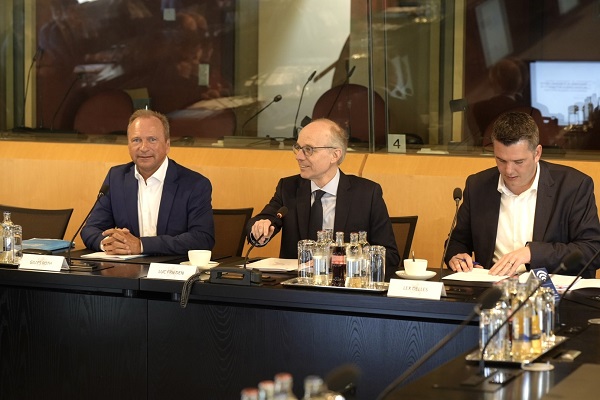 (L-R) Gilles Roth, Luxembourg's Minister of Finance; Luc Frieden, Prime Minister of Luxembourg; Lex Delles, Luxembourg's Minister of the Economy, SMEs, Energy and Tourism;
Credit: © ME (Ministry of State)
(L-R) Gilles Roth, Luxembourg's Minister of Finance; Luc Frieden, Prime Minister of Luxembourg; Lex Delles, Luxembourg's Minister of the Economy, SMEs, Energy and Tourism;
Credit: © ME (Ministry of State)
As reported by their respective government ministries, Luxembourg's Prime Minister Luc Frieden, the Minister of the Economy, SMEs, Energy and Tourism, Lex Delles, and the Minister of Finance, Gilles Roth, met with social partners at the Château de Senningen on Monday 15 April 2024, as part of the cycle of social dialogue of the European Semester.
During this first meeting of the year between the social partners and government representatives (as part of the national social dialogue), the stakeholders discussed the key elements of the current coordination cycle.
Members of the government presented this year's National Reform Programme and Stability and Growth Programme whose general orientations and budgetary policy objectives overlap with the 2024 state budget and the 2023-2027 multi-annual financial programming. The Minister of Finance also took stock of the progress made in the implementation of the Recovery and Resilience Plan which allows Luxembourg to receive European financial support to the tune of €241 million.
More generally, Minister Roth specified that under the agreement concluded on a new European budgetary governance, 2024 marks a year of transition at European and national level. Therefore, these represented the last National Reform Programme and Stability and Growth Programme presented by the government. These programmes will be replaced by a medium-term budgetary and structural plan.
Luxembourg will submit the programmes to the European Commission at the end of April 2024; the government ministers presented them to the social partners, as well as the Chamber of Deputies (Luxembourg's parliament), ahead of this submission to the European institutions.
In the current economic context, Prime Minister Frieden stressed that "dialogue with social partners is a key element of social peace in Luxembourg and represents an essential asset for the country's development. In an international context marked by serious conflicts, these exchanges are important for the economic development of the country. The government is committed to continuing in this tradition with a view to addressing major economic and social issues."
Economy Minister Lex Delles clarified that "we have been witnessing for several years an acceleration of digitalisation, and the risks and threats linked to climate change and the deterioration of the natural environment are becoming more and more pressing. Luxembourg's National Reform Programme describes the government's strategy to lay the foundations for our country's dual digital and sustainable transition. It is important that our future development is based on a digital, sustainable, low-carbon and circular economy. In the years to come, Luxembourg will have to continue to make significant investments in the dual digital and sustainable transition, on the one hand with a view to providing the country with the necessary framework conditions and infrastructure, and on the other hand also with a view to supporting our businesses and citizens."
Finance Minister Gilles Roth added that "the government has the ambition to pursue a responsible budgetary policy. We must succeed in maintaining public investments at a high level, supporting economic players and supporting households. At the same time, it is essential to adopt a sustainable path in terms of public finances. The Stability and Growth Programme reflects these budgetary policy objectives."
The European Semester is an annual coordination cycle of economic, budgetary, social and labour policies within the European Union. Since 2015, Luxembourg's social partners have regularly met government representatives several times a year to discuss the key elements of this coordination cycle.









